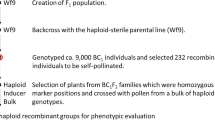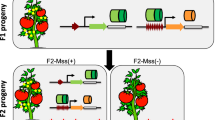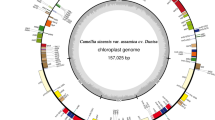Abstract
Interspecific hybridization and polyploidization may involve programmed genetic and epigenetic changes. In this study, we used the methylation-sensitive amplified polymorphism (MSAP) method to survey cytosine methylation alterations that occurred in F1 hybrid and BC1 progeny following interspecific hybridization between Oryza sativa and O. officinalis. Across all 316 parental methylated sites, 25 (7.9%) cytosine methylation alterations were detected in the F1 and/or BC1 progeny. Thirty additional cytosine methylation alterations were detected at parental non-methylated or novel sites. In total, 55 cytosine methylation alterations (90.9% of all alterations) were detected in the F1 hybrid, which were maintained in the BC1 progeny. The alterations in cytosine methylation were biased toward the O. officinalis parent and were in some cases repeatable in independent hybridizations between O. sativa and O. officinalis. Twelve fragments showing cytosine methylation alterations were isolated, sequenced and subsequently validated by methylation-sensitive Southern blot analysis. Where possible, we designed species-specific primers to amplify the polymorphic transcripts from either the O. sativa or the O. officinalis parent using reverse transcription (RT)-PCR in combination with single-strand conformation polymorphism (SSCP) analysis. In four of five cases, modified gene expression could be correlated with the altered cytosine methylation pattern. Our results demonstrated cytosine methylation alterations induced by interspecific hybridization between a rice cultivar and its wild relative, and indicated a direct relationship between cytosine methylation alteration and gene expression variation.




Similar content being viewed by others
References
Adams KL, Cronn R, Percifield R, Wendel JF (2003) Genes duplicated by polyploidy show unequal contributions to the transcriptome and organ specific reciprocal silencing. Proc Natl Acad Sci USA 100:4649–4654
Adams KL, Percifield R, Wendel JF (2004) Organ-specific silencing of duplicated genes in a newly synthesized cotton allotetraploid. Genetics 168:2217–2226
Albertin W, Balliau T, Brabant P, Chevre A-M, Eber F, Malosse C, Thiellement H (2006) Numerous and rapid nonstochastic modifications of gene products in newly synthesized Brassica napus allotetraploids. Genetics 173:1101–1113
Bottley A, Xia GM, Koebner RMD (2006) Homoeologous gene silencing in hexaploid wheat. Plant J 47:897–906
Brar DS, Khush GS (1997) Alien introgression in rice. Plant Mol Biol 35:35–47
Comai L, Tyagi AP, Winter K, Holmes-Davis R, Reynolds SH, Stevens Y, Byers B (2000) Phenotypic instability and rapid gene silencing in newly formed Arabidopsis allotetraploids. Plant Cell 12:1551–1568
Feldman M, Liu B, Segal G, Abbo S, Levy A, Vega J (1997) Rapid elimination of low-copy sequences in polyploid wheat: a possible mechanism for differentiation of homoeologous chromosomes. Genetics 147:1381–1387
Gaeta RT, Pires JC, Iniguez-Luy F, Leon E, Osborna TC (2007) Genomic changes in resynthesized Brassica napus and their effect on gene expression and phenotype. Plant Cell 19:3403–3417
He P, Friebe B, Gill B, Zhou JM (2003) Allopolyploidy alters gene expression in the highly stable hexaploid wheat. Plant Mol Biol 52:401–414
Huang Z, He GC, Shu LH, Li XH, Zhang QF (2001) Identification and mapping of two brown planthopper genes in rice. Theor Appl Genet 102:929–934
Jin HJ, Tan GX, Brar DS, Tang M, Li G, Zhu LL, He GC (2006) Molecular and cytogenetic characterization of an Oryza officinalis–O. sativa chromosome 4 addition line and its progenies. Plant Mol Biol 62:769–777
Josefsson C, Dilkes B, Comai L (2006) Parent-dependent loss of gene silencing during interspecies hybridization. Curr Biol 16:1322–1328
Kashkush K, Feldman M, Levy A (2002) Gene loss, silencing, and activation in newly synthesized wheat allopolyploids. Genetics 160:1651–1659
Lee HS, Chen J (2001) Protein-coding genes are epigenetically regulated in Arabidopsis polyploids. Proc Natl Acad Sci USA 98:6753–6758
Liu B, Wendel JF (2003) Epigenetic phenomena and the evolution of plant allopolyploids. Mol Phylogenet Evol 29:365–379
Liu B, Vega JM, Feldman M (1998a) Rapid genomic changes in newly synthesized amphiploids of Triticum and Aegilops. II. Changes in low-copy coding DNA sequences. Genome 41:535–542
Liu B, Vega JM, Segal G, Abbo S, Rodova M, Feldman M (1998b) Rapid genomic changes in newly synthesized amphiploids of Triticum and Aegilops. I. Changes in low-copy non-coding DNA sequences. Genome 41:272–277
Liu B, Brubaker CL, Mergeai G, Cronn RC, Wendel JF (2001) Polyploid formation in cotton is not accompanied by rapid genomic changes. Genome 43:874–880
Lukens LN, Pires JC, Leon E, Vogelzang R, Oslach L, Osborn T (2006) Patterns of sequence loss and cytosine methylation within a population of newly resynthesized Brassica napus allopolyploids. Plant Physiol 140:336–348
Madlung A, Masuelli R, Watson B, Reynolds S, Davison J, Comai L (2002) Remodeling of DNA methylation and phenotypic and transcriptional changes in synthetic Arabidopsis allotetraploids. Plant Physiol 129:733–746
Madlung A, Tyagi AP, Watson B, Jiang H, Kagochi T, Doerge RW, Martienssen R, Comai L (2005) Genomic changes in synthetic Arabidopsis polyploids. Plant J 41:221–230
Martienssen RA, Colot V (2001) DNA methylation and epigenetic inheritance in plants and filamentous fungi. Science 293:1070–1074
Murray MG, Thompson WF (1980) Rapid isolation of high-molecular-weight plant DNA. Nucleic Acids Res 8:4321–4325
Ozkan H, Levy A, Feldman M (2001) Allopolyploidy-induced rapid genome evolution in the wheat (Aegilops-Triticum) group. Plant Cell 13:1735–1747
Rangwala SH, Richards EJ (2004) The value-added genome: building and maintaining genomic cytosine methylation landscapes. Curr Opin Genet Dev 14:686–691
Rapp RA, Wendel JF (2005) Epigenetics and plant evolution. New Phytol 168:81–91
Reyna-Lopez GE, Simpson J, Ruiz-Herrera J (1997) Differences in DNA methylation patterns are detectable during the dimorphic transition of fungi by amplification of restriction polymorphisms. Mol Gen Genet 253:703–710
Riddle NC, Birchler JA (2003) Effects of reunited diverged regulatory hierarchies in allopolyploids and species hybrids. Trends Genet 19:597–600
Rieseberg LH, Wendel JF (2004) Plant speciation—rise of the poor cousins. New Phytol 161:3–8
Salmon A, Ainouche ML, Wendel JF (2005) Genetic and epigenetic consequences of recent hybridization and polyploidy in Spartina (Poaceae). Mol Ecol 14:1163–1175
Shaked H, Kashkush K, Ozkan H, Feldman M, Levy A (2001) Sequence elimination and cytosine methylation are rapid and reproducible responses of the genome to wide hybridization and allopolyploidy in wheat. Plant Cell 13:1749–1759
Song K, Lu P, Tang K, Osborn TC (1995) Rapid genome change in synthetic polyploids of Brassica and its implications for polyploidy evolution. Proc Natl Acad Sci USA 92:7719–7723
Tan GX, Jin HJ, Li G, He RF, Zhu LL, He GC (2005) Production and characterization of a complete set of individual chromosome additions from Oryza officinalis to Oryza sativa using RFLP and GISH analyses. Theor Appl Genet 111:1585–1595
Uozu S, Ikehashi H, Ohmido N, Ohtsubo H, Ohtsubo E, Fukui K (1997) Repetitive sequences: cause for variation in genome size and chromosome morphology in the genus Oryza. Plant Mol Biol 35:791–799
Vaughan DA, Morishima H, Kadowaki K (2003) Diversity in the Oryza genus. Curr Opin Plant Biol 6:139–146
Wang J, Tian L, Madlung A, Lee H, Chen M, Lee J, Watson B, Kagochi T, Comai L, Chen ZJ (2004) Stochastic and epigenetic changes of gene expression in Arabidopsis polyploids. Genetics 167:1961–1973
Wang J, Tian L, Lee HS, Wei NE, Jiang HM, Watson B, Madlung A, Osborn TC, Doerge RW, Comai L, Chen ZJ (2006) Genomewide nonadditive gene regulation in Arabidopsis allotetraploids. Genetics 172:507–517
Wendel JF, Schnabel A, Seelanan T (1995) Bidirectional interlocus concerted evolution following allopolyploid speciation in cotton (Gossypium). Proc Natl Acad Sci USA 92:280–284
Xiong LZ, Xu CG, Maroof MAS, Zhang Q (1999) Patterns of cytosine methylation in an elite rice hybrid and its parental lines, detected by a methylation-sensitive amplification polymorphism technique. Mol Gen Genet 261:439–446
Zhang X, Shiu S, Cal A, Borevitz JO (2008) Global analysis of genetic, epigenetic and transcriptional polymorphisms in Arabidopsis thaliana using whole genome tiling arrays. PLoS Genet 4:e1000032
Acknowledgments
We are very grateful to Dr. Pat Heslop-Harrison for his comment and advice and anonymous reviewers for critical and constructive suggestions to improve this manuscript. This study was supported by grants from the National Program of High Technology Development and R&D Special Fund for Public Welfare of China (200803073). This work has been carried out in compliance with the current laws governing biological experimentation in China.
Author information
Authors and Affiliations
Corresponding author
Additional information
Communicated by P. Heslop-Harrison.
Electronic supplementary material
Below is the link to the electronic supplementary material.
Rights and permissions
About this article
Cite this article
Jin, H., Hu, W., Wei, Z. et al. Alterations in cytosine methylation and species-specific transcription induced by interspecific hybridization between Oryza sativa and O. officinalis . Theor Appl Genet 117, 1271–1279 (2008). https://doi.org/10.1007/s00122-008-0861-9
Received:
Accepted:
Published:
Issue Date:
DOI: https://doi.org/10.1007/s00122-008-0861-9




